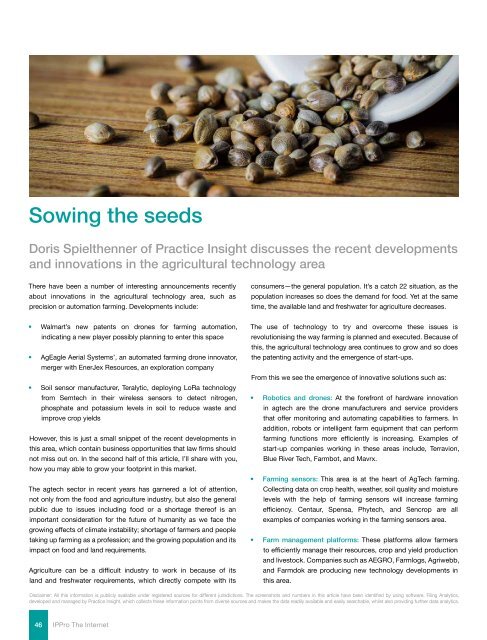IPPro Issue 002
IPPro is the go-to industry publication for news, views, and opinion on patent practice, law and management. The fortnightly publication and accompanying website - the only free-to-read intellectual property resource around - cover the full spectrum of IP law globally, including prosecution, litigation, licensing, management and technology.
IPPro is the go-to industry publication for news, views, and opinion on patent practice, law and management. The fortnightly publication and accompanying website - the only free-to-read intellectual property resource around - cover the full spectrum of IP law globally, including prosecution, litigation, licensing, management and technology.
Create successful ePaper yourself
Turn your PDF publications into a flip-book with our unique Google optimized e-Paper software.
Agricultural Technology<br />
Sowing the seeds<br />
Doris Spielthenner of Practice Insight discusses the recent developments<br />
and innovations in the agricultural technology area<br />
There have been a number of interesting announcements recently<br />
about innovations in the agricultural technology area, such as<br />
precision or automation farming. Developments include:<br />
<br />
<br />
<br />
Walmart’s new patents on drones for farming automation,<br />
indicating a new player possibly planning to enter this space<br />
AgEagle Aerial Systems’, an automated farming drone innovator,<br />
merger with EnerJex Resources, an exploration company<br />
Soil sensor manufacturer, Teralytic, deploying LoRa technology<br />
from Semtech in their wireless sensors to detect nitrogen,<br />
phosphate and potassium levels in soil to reduce waste and<br />
improve crop yields<br />
However, this is just a small snippet of the recent developments in<br />
this area, which contain business opportunities that law firms should<br />
not miss out on. In the second half of this article, I’ll share with you,<br />
how you may able to grow your footprint in this market.<br />
The agtech sector in recent years has garnered a lot of attention,<br />
not only from the food and agriculture industry, but also the general<br />
public due to issues including food or a shortage thereof is an<br />
important consideration for the future of humanity as we face the<br />
growing effects of climate instability; shortage of farmers and people<br />
taking up farming as a profession; and the growing population and its<br />
impact on food and land requirements.<br />
Agriculture can be a difficult industry to work in because of its<br />
land and freshwater requirements, which directly compete with its<br />
consumers—the general population. It’s a catch 22 situation, as the<br />
population increases so does the demand for food. Yet at the same<br />
time, the available land and freshwater for agriculture decreases.<br />
The use of technology to try and overcome these issues is<br />
revolutionising the way farming is planned and executed. Because of<br />
this, the agricultural technology area continues to grow and so does<br />
the patenting activity and the emergence of start-ups.<br />
From this we see the emergence of innovative solutions such as:<br />
Disclaimer: All this information is publicly available under registered sources for different jurisdictions. The screenshots and numbers in this article have been identified by using software, Filing Analytics,<br />
developed and managed by Practice Insight, which collects these information points from diverse sources and makes the data readily available and easily searchable, whilst also providing further data analytics.<br />
<br />
<br />
<br />
Robotics and drones: At the forefront of hardware innovation<br />
in agtech are the drone manufacturers and service providers<br />
that offer monitoring and automating capabilities to farmers. In<br />
addition, robots or intelligent farm equipment that can perform<br />
farming functions more efficiently is increasing. Examples of<br />
start-up companies working in these areas include, Terravion,<br />
Blue River Tech, Farmbot, and Mavrx.<br />
Farming sensors: This area is at the heart of AgTech farming.<br />
Collecting data on crop health, weather, soil quality and moisture<br />
levels with the help of farming sensors will increase farming<br />
efficiency. Centaur, Spensa, Phytech, and Sencrop are all<br />
examples of companies working in the farming sensors area.<br />
Farm management platforms: These platforms allow farmers<br />
to efficiently manage their resources, crop and yield production<br />
and livestock. Companies such as AEGRO, Farmlogs, Agriwebb,<br />
and Farmdok are producing new technology developments in<br />
this area.<br />
<br />
<br />
Data management and analytics: Focusing on using machine<br />
learning and big data analytics to manage and analyse data on<br />
farm and livestock, that can assist farmers to make informed<br />
decisions that can save energy, increase efficiency, optimise<br />
herbicide and pesticide application, and manage risk. Companies<br />
such as Strider, Cibo, Prospera, TL biolabs, Farmnote, Gamaya,<br />
CropZilla, and Agralogics are providing data management and<br />
analytics solutions.<br />
Smart irrigation: Systems for monitoring and automating water<br />
supply and usage for farms. Companies such as Flowius, cropX,<br />
Aquaspy, and Tevatronic are some examples of startups in this<br />
area.<br />
Indoor farming: Indoor farming and hydroponics provide an<br />
alternative solution to the agricultural land shortage problem.<br />
InFarm are currently working in this area.<br />
Autonomous farming equipment and vehicles plus navigation<br />
technology is moving at a fast pace. In some cases, the development<br />
is perceived to be even faster than in the standard automobile<br />
industry, as these off-road farming vehicles don’t have to deal with<br />
standard road challenges such as changing lanes, pedestrians, and<br />
other drivers on the road.<br />
The agricultural technology field is filled with many business<br />
development opportunities for attorneys and law firms to obtain,<br />
as innovative start-ups produce new patents. Keeping in mind that<br />
there is the disadvantage of a low volume of work while they are in<br />
their infancy. While corporates may offer higher volumes, trying to<br />
establish a new business relationship with them can be a difficult and<br />
time consuming process.<br />
Further, many corporates will do their filing in-house or have<br />
a preference for using an established group of law firms.<br />
For example, Bayer CropScience AG is a fairly ‘captured’ client, as<br />
they regularly use the same law firms to represent them in various<br />
jurisdictions, but more importantly they self-file a large volume of<br />
their work.<br />
As the field of agricultural<br />
technology area continues to grow,<br />
law firms should weigh up the time and<br />
expenditure they would need to invest to<br />
break into the market of being a preferred<br />
law firm for an existing corporate, against<br />
obtaining work from agtech start-ups<br />
What this means is that although the overall filing volume by Bayer<br />
CropScience is large, only a small portion of it is available for external<br />
law firms, and possibly none at all for any new law firms to try and obtain.<br />
Another example of where a corporate already has many pre-existing<br />
business relationships with law firms is Monsanto. While Monsanto<br />
doesn’t have a large volume of self-filed applications, they appear<br />
to have very strong existing business relationships with external law<br />
firms, who get regular filings from them year by year. A snapshot<br />
of the PCT case flow for Monsanto LLC (US) from Filing Analytics<br />
displays this aspect clearly. Please note that law firm names have<br />
been replaced with generic titles such as “law firm A”.<br />
However, startups have only a few patent filings due to their infancy<br />
and they usually work with one or at the most, a few law firms. Selffiling<br />
is rare, as startups tend to focus more on building their business<br />
rather than in-house legal capability. For example, the following agtech<br />
start-ups work solely with one law firm: Terravion works with Perkins<br />
Coie LLP; Strider Labs works with Kahler Käck Mollekopf, Infarm<br />
GmbH has worked with Reiniger und Partner for their EP and DE<br />
filings; and Centaur Inc is represented by Polsinelli Shugart in the US.<br />
It is quite possible that these startups will increase their patent<br />
filings and then widen their representation options in the future. It’s<br />
also possible that if the start-up doesn’t already have a law firm<br />
representation in your jurisdiction, then perhaps you can grab the<br />
opportunity to be their representing law firm.<br />
As the field of agtech area continues to grow, law firms should weigh<br />
up the time and expenditure they would need to invest to break into<br />
the market of being a preferred law firm for an existing corporate,<br />
against obtaining work from agtech start-ups. Especially, as the<br />
start-up business for your law firm could increase significantly in a<br />
one- to five-year period.<br />
The growth and pace of innovation in this field and the opportunities<br />
to work with many startups certainly makes it a clear case on why<br />
law firms already working in related areas (automotive, high tech and<br />
electronics, automation and robotics) should not overlook the ripe<br />
business development opportunities in agricultural technology. <strong>IPPro</strong><br />
Doris Spielthenner, general manager, Practice Insight<br />
46 <strong>IPPro</strong> The Internet www.ipprotheinternet.com 47





